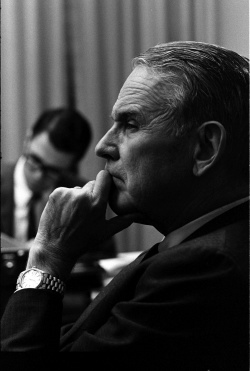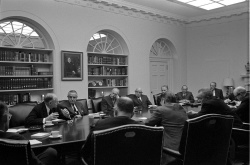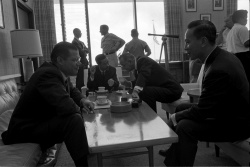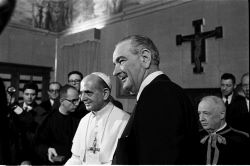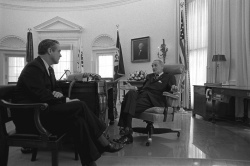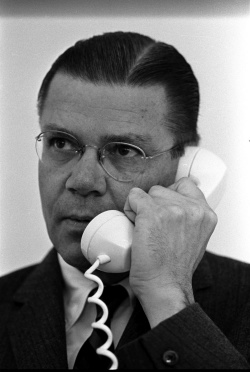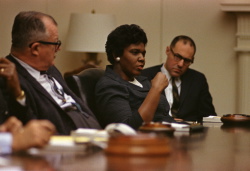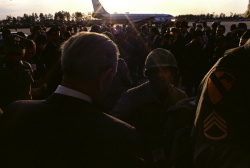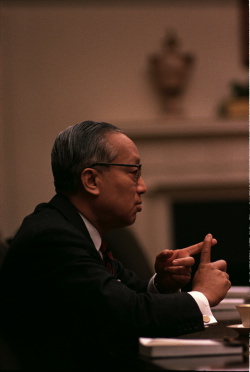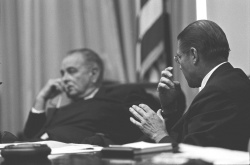1st2nd3rd4th5th6th7th8th9th10th11th12th13th14th15th16th17th18th19th20th21st22nd23rd24th25th26th27th28th29th
February 1st
On this day in 1966, President Johnson spoke on the telephone with U. S. Senator Eugene McCarthy of Minnesota. In the conversation, LBJ teased McCarthy; he discussed McCarthy’s concerns about bombing in Vietnam and suggested that General Maxwell Taylor (Special Consultant to the President and Chairman of the Foreign Intelligence Advisory Board) brief McCarthy about Vietnam; talked about Taylor’s past role in Vietnam policy; and spoke of the effect of congressional criticism of Vietnam policy on Ho Chi Minh, North Vietnam.
On this day in 1966, President Johnson spoke on the telephone with General Maxwell Taylor. He asked General Taylor to brief U. S. Senator Eugene McCarthy on Vietnam bombing—the importance of the bombing, congressional and public opposition to bombing, USSR Ambassador’s request for bombing halt extension, and the lack of response from North Vietnam.
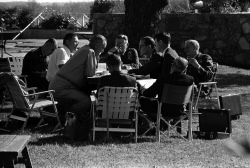 Pres. Lyndon B. Johnson meeting with Joint Chiefs of Staff around picnic table on LBJ Ranch front lawn.
Pres. Lyndon B. Johnson meeting with Joint Chiefs of Staff around picnic table on LBJ Ranch front lawn.credit: Yoichi Okamoto
On this day in 1965, President Johnson presented the Distinguished Service Medal to General Curtis LeMay, outgoing chief of Staff, U. S. Air Force, in ceremonies at the White House.
“Under General Curtis LeMay, America has built the mightiest air arm the world has ever known: the Strategic Air Command. Yet, the sole purpose of SAC has been to preserve the peace, and that purpose will never change.
“Today we are nearer the year 2000 than the year 1929. Over those years ahead weapons will change and strategies will change and challenges and dangers will change, but America’s need and freedom’s need will not change for the kind of dedicated, determined, demanding, and inspiring commander that is epitomized by Curtis LeMay. By his leadership and his imagination, this man of courage helped to shorten history’s costliest war in both Europe and the Pacific, and he helped to prevent mankind’s final war with both the response of the Berlin Airlift and the readiness of the Strategic Air Command.
“General LeMay, all free men today are in your debt, and all your countrymen join with me in proudly and gratefully saluting you. In your service you have raised our standards in the military—our standards of readiness, of performance, of proficiency, and of economy. You have helped America set a worldwide watch for freedom, and that vigil will never cease until liberty and justice are secure on this earth.
“I am very proud to confer upon you now, General LeMay, your fourth Distinguished Service Medal, and, on behalf of a grateful country, to wish you Godspeed and happy landings.”
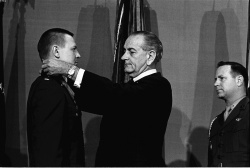 Pres. Lyndon B. Johnson presents the Medal of Honor to Maj. Merlyn Dethlefsen, USAF
Pres. Lyndon B. Johnson presents the Medal of Honor to Maj. Merlyn Dethlefsen, USAFcredit: Yoichi Okamoto
On this day in 1968, President Johnson presented the Medal of Honor to Major Merlyn Dethlefsen in the East Room of the White House.
On this day in 1968, President Johnson spoke at the signing ceremony for the Economic Report.
“This report sees no halt. In the year ahead, if we are fiscally responsible and act accordingly, our gross national product will grow about $60 billion, 96 percent of our labor force will remain employed.
…
“In short, I believe our Nation needs this tax bill to conduct—properly and prudently—the affairs of a great democracy.”
The tax bill to which the President referred was approved June 28 as the Revenue and Expenditure Control Act of 1968.
February 2nd
On this day in 1965, President Johnson made a toast at a dinner honoring the Vice-President (Hubert Humphrey), the Speaker (John McCormack), and the Chief Justice (Earl Warren).
“When our system was conceived, our forefathers took great care to separate the executive, legislative, and judicial powers, and that concept has served us faithfully and well.
“Yet, tonight, we come together to celebrate not the separation of powers but the unity of purposes among the various branches of our great American Government.
“In this century—and perhaps in all our history—there have been few other times when there has been such close accord in the purposes of the executive, legislative, and judiciary.
“Among all three there is a common determination that now, while we are a strong and united people, we shall strive on-against all odds and past all obstacles—to fulfill the ideals to which America is dedicated.”
At that dinner, actors Hume Cronyn and Jessica Tandy performed Hear America Speaking at a White House dinner honoring the Vice-President Hubert Humphrey, Speaker of the House John McCormack, and Chief Justice Earl Warren.
February 3rd
On this day in 1965, President Johnson received the Anti-Defamation League Award.
“Mr. Vice-President, I think it is no wonder that so many Presidents have cheerfully and gratefully been the guests of the Anti-Defamation League. For the work that you have done in the local communities as well as in the halls of Congress, you have ignited the flames of freedom across this great country. Wherever your torches burn, there tolerance and decency and charity have been illuminated. Bigots and bias hide whenever you come into view, but you are much more than anti-prejudice—you are pro-justice and you are pro-freedom. So it is with great pride and satisfaction that I come here this evening to commend you and to salute you.”
On this day in 1966, President Johnson sent a message of congratulations following the Landing on the Moon of the U.S.S.R.’s Luna 9. LBJ wrote,
Dear Mr. Chairman: You and the people of the Union of Soviet Socialist Republics are to be congratulated for the great success of Luna 9. Your accomplishment is one that can benefit all mankind. And all mankind applauds it. Your scientists have made a major contribution to man’s knowledge of the moon and of space.
The unmanned Soviet spaceship had made a successful soft landing on the moon—the first of its kind. Following the landing, photographic data was sent back to earth.
On this day in 1964, the actor Hal Holbrook entertained at a White House reception for 400 college editors.
February 4th
On this day in 1964, President Johnson witnessed the Certification of the 24th Amendment to the Constitution, abolishing the poll tax. LBJ stated,
“Today, the United States witnesses the triumph of liberty over restriction. Today, the people of this land have abolished the poll tax as a condition to voting. By this act they have reaffirmed the simple but unbreakable theme of this Republic: nothing is so valuable as liberty, and nothing is so necessary to liberty as the freedom to vote without bans or barriers.
…
“There can now be no one too poor to vote; there is no longer a tax on his rights. The only enemy to voting that we face today is indifference—too many of our citizens treat casually what other people in other lands are ready to die for.”
On this day in 1965, President Johnson spoke at the Presidential Prayer Breakfast at the Shoreham Hotel in Washington, D.C.
“In these times, more than any other, the public life is a lonely life. The burden of every vote, of every decision, of every act, and, yes, even of every utterance, is too great to be shared and much too great to be borne alone.
“I find for myself, as I know men and women throughout this great Government of ours also find, a sustaining strength from the moments of prayer—whether we assemble together or whether we pray silently alone.
“What has become a tradition and practice in our time is actually one of the oldest public traditions of our national life. Long ago, when this country was struggling to come into being, there arose at the Constitutional Convention a discussion and a debate about holding prayers before each session at that Convention. The great Benjamin Franklin spoke up to speak his views. I believe it is appropriate and timely this morning to repeat and to endorse those words now.
“Dr. Franklin told the framers of our Constitution, and I quote him, ‘Without His concurring aid, we shall succeed in this political building no better than the builders of Babel. We shall be divided by our little partial local interests; our projects will be confounded, and we ourselves shall become a reproach and a by-word down to future ages. And, what is worse,’ Dr. Franklin went ahead to add, ‘mankind may hereafter, from this unfortunate instance, despair of establishing government by human wisdom and leave it to chance and to war and to conquest.’
“Today, in our times, the responsibilities and the burdens imposed upon each of us are great and frightening and growing. On us—on each of us—on our decisions that we individually and collectively make—rests the hope of mankind throughout the world for a world that is not left to chance, or not left to war, or not left to conquest.”
February 5th
On this day in 1968, President Johnson met with foreign policy advisors, “The Wise Men,” at the White House regarding Vietnam.
On this day in 1968, President Johnson sent a special message to the Congress on Education: “The Fifth Freedom.”
To meet our urgent needs within a stringent overall budget, several programs must be reduced or deferred. We can reduce expenditures on construction of facilities and the purchase of equipment. But, many of our urgent educational programs which directly affect the young people of America cannot be deferred. For the cost—the human cost—of delay is intolerable.
These principles underlie my 1969 budgetary recommendations and the proposals in this message. My recommendations are tailored to enable us to meet our most urgent needs, while deferring less important programs and expenditures.”
In 1941, President Franklin D. Roosevelt had outlined “four essential freedoms”—freedom of speech, freedom of worship, freedom of want, and freedom from fear. President Johnson added a fifth freedom: “The fifth is freedom from ignorance.”
February 6th
On this day in 1966, President Johnson made welcoming remarks to Vietnamese leaders upon arriving at the Honolulu International Airport.
The President welcomed Lieutenant General Nguyun Van Thieu and Prime Minister Nguyen Cao Ky. The President and Vietnamese leaders held strategic talks on how to deal with the War; these meetings have been referred to as “The Honolulu Conference.”
“It is a question of the gravest importance to all other nations, large or small, whose peoples seek to walk in independence and peace. For, were the Communist aggressors to win in Vietnam, they would know that they can accomplish through so-called ‘wars of national liberation’ what they could not accomplish through naked aggression in Korea; or insurgency in the Philippines, in Greece and Malaya; or the threat of aggression in Turkey; or in a free election booth anywhere in the world.
“During the past year, more than 1,300 Americans have lost their lives from Communist action in Vietnam, but more than 11,000 of our Vietnamese brothers-in-arms died last year protecting their homeland.
“Why do these Vietnamese fight on? Because they are not going to let others enslave them or rule their future. And with their soldiers are the administrators and civil officials and the villagers themselves—to many of whom each darkness of the evening is filled with fear, and to many of whom each noise in the night may be a terrorist's bomb or an assassin’s grenade.
“And, yet, they fight on.
“They fight for dreams beyond the din of battle—the dream of security in their village, a teacher for their children, food for their bodies, medicine for their sick, the right to worship in the way they choose. They fight for the essential rights of human existence, and only the callous or the timid can ignore their cause.
“There are special pleaders who counsel retreat in Vietnam. They belong to a group that has always been blind to experience and has been deaf to hope. We cannot accept their logic that tyranny 10,000 miles away is not tyranny to concern us, or that subjugation by an armed minority in Asia is different from subjugation by an armed minority in Europe. Were we to follow their course, how many nations might fall before the aggressor? Where would our treaties be respected, our word honored, and our commitments believed?
“In the ’40s and the ’50s we took our stand in Europe to protect the freedom of those threatened by aggression. If we had not then acted, what kind of Europe might there be today?
“Now the center of attention has shifted to another part of the world where aggression is on the march and enslavement of free men is its goal.
“Our stand must be as firm as ever.
“If we allow the Communists to win in Vietnam, it will become easier and more appetizing for them to take over other countries in other parts of the world. We will have to fight again someplace else—at what cost no one knows, and that is why it is vitally important to every American that we stop the Communists in South Vietnam.”
On this day in 1964, Cuban President Fidel Castro cut the water supply to the U.S. naval base at Guantanamo to protest U.S. seizure of Cuban fishing boats. President Johnson took steps to give the base a self-sufficient supply of water and labor.
February 7th
On this day in 1965, President Johnson spoke on the telephone with Cyrus Vance, Deputy Secretary of Defense. Vance reported on the success of a U. S. retaliatory air strike on Dong Hoi in North Vietnam following an attack on the U. S. Army Barracks at Pleiku; all U. S. planes were safe except for one downed pilot.
On this day in 1967, President Johnson replied to a message from Pope Paul VI on Vietnam.
Your Holiness:
I deeply appreciate your message, which is a great source of spiritual support. I devoutly share your wish that the suspension of hostilities over the Lunar New Year may be extended and may open the way to negotiations for a just and stable peace.
The Governments of the United States and the Republic of Vietnam, together with others, are devoting intensive efforts to this end. As you know, the Government of Vietnam has twice signified its readiness to discuss an extension of the truce with representatives of the other side.
We are prepared to talk at any time and place, in any forum, with the object of bringing peace to Vietnam; however, I know you would not expect us to reduce military action unless the other side is willing to do likewise.
We are prepared to discuss the balanced reduction in military activity, the cessation of hostilities, or any practical arrangements which could lead to these results.
We shall continue our efforts for a peaceful and honorable settlement until they are crowned with success.
With great respect,
Sincerely,
LYNDON B. JOHNSON
February 8th
On this day in 1965, President Johnson gave a special message to the Congress on Conservation and Restoration of Natural Beauty.
“Certainly no one would hazard a national definition of beauty, but we do know that nature is nearly always beautiful. We do, for the most part, know what is ugly, and we can introduce, into all our planning, our programs, our building and our growth, a conscious and active concern for the values of beauty. If we do this, then we can be successful in preserving a beautiful America.”
On this day in 1968, President Johnson met with the Prime Minister of the United Kingdom, Harold Wilson, during an official visit at the White House. The evening of February 8th, singers Robert Merrill and Veronica Tyler performed at a dinner for Prime Minister Wilson.
February 9th
On this day in 1965, President Johnson conferred with the Reverend Martin Luther King, Jr. The President pledged swift action on voting rights legislation.
On this day in 1967, President Johnson met at the White House with King Hassan II of Morocco. The evening of February 9th, the ballet The Moor’s Pavane was performed by Jose Limon, Pauline Koner, Lucas Hoving, and Betty Jones at a dinner in honor of King Hassan II, Morocco.
On this day in 1968, President Johnson met with the Prime Minister of the United Kingdom, Harold Wilson, during an official visit at the White House. The evening of February 8th, singers Robert Merrill and Veronica Tyler performed at a dinner for Prime Minister Wilson.
February 10th
On this day in 1968, President Johnson issued a statement upon signing a proclamation marking the anniversary of the League of United Latin American Citizens (LULAC.)
“LULAC is a household word in Texas. We know it to mean a group of patriotic, devoted Americans who, for 39 years, have taken an active concern in the well-being and the future of the 10.5 million Spanish-speaking Americans.
“LULAC has always recognized that education is the key that will open the doors of opportunity. In the past 5 years this administration has made long strides toward our goal of giving every American all the education he wants and is capable of. This is LULAC’s goal as well.
“LULAC has councils in 19 States. An important part of its program is to teach English to young Spanish-speaking Americans so they can make their full contribution to the society of which they are a part.
“I know the dreams of these young Americans. In a little schoolhouse in Cotulla, Texas, I saw the hunger for learning in the eyes of children. I resolved then, as a young teacher, that I would do all in my power to satisfy their aspiration. In this effort of a lifetime, I have found LULAC at my side every step of the way.
“It is therefore a special honor for me as President to proclaim the week beginning Sunday, February 11, as LULAC Week throughout the United States.”
On this day in 1964, President Johnson gave a statement upon making public his report to the Congress on Communications Satellites.
“The year 1963 has been a time of fruitful achievement aimed at reaching the objectives set by Congress in the Communications Satellite Act.
“The program to establish a global communications satellite system to meet the many objectives of the act is progressing well in light of the complexities of the problem.
“An entirely new long-haul communications transmission system is being fitted into the complex technical and organizational arrangements of the growing international communication structure.
“These efforts are going forward with ingenuity and determination on the part of the Government, the Corporation, the U.S. international communications carriers, and telecommunication entities overseas.”
The report stated that plans for a commercial communications satellite system were well underway; that the policy of the United States continued to be that communications by means of satellites be available as soon as possible and on a global and non-discriminatory basis; that the Corporation would investigate both synchronous and medium-altitude satellites for its basic system. It further stated that the Space Radio Communication Conference held in Geneva during October and November, 1963, had allocated frequency bands for the satellites.
On this day in 1966, President Johnson made remarks at the National Medal of Science Presentation Ceremony.
“We recognize those accomplishments today by conferring on these men the National Medal of Science—the highest tribute their Government can pay them.
…
“The National Medal of Science honors individual achievement. It reminds us that in a Nation of millions, and in a world of billions, the individual is still the first and basic agent of change. Without the unfettered curiosity of individual men probing and reaching for new truth, our planet would be a dry and dreary place.”
On this day in 1964, The National Ballet performed a Children’s Concert at the White House.
On this day in 1967, the Twenty-Fifth Amendment to the U.S. Constitution was ratified. The amendment provided for the appointment of the Vice-President should the office become vacant and provided for succession to the presidency should the President become disabled and unable to fulfill the responsibilities of the office.
On this day in 1967, President Johnson met at the White House with King Hassan II of Morocco. The evening of February 9th, the ballet The Moor’s Pavane was performed by Jose Limon, Pauline Koner, Lucas Hoving, and Betty Jones at a dinner in honor of King Hassan II, Morocco.
February 11th
On this day in 1964, President Johnson sent a letter to Sargent Shriver regarding his appointment to direct the Program to Eliminate Poverty.
As my representative, you will direct the activities of all executive departments and agencies involved in the program against poverty. You will also be my representative in presenting to the Congress the Administration’s views with respect to necessary legislation.
I have called upon all departmental and agency heads and their personnel to dedicate themselves to this great task, and to exert their maximum energies and resources to assist our fellow citizens who are ill-clad, ill-fed, ill-housed or to whom the door of self-improvement and opportunity is closed.
Since this campaign against poverty will be an important part of the work of the Cabinet, I am asking you to attend its meetings.
You will also undertake the coordination and integration of the federal program with the activities of state and local governments and of private persons, including the Foundations, private business and industry, labor unions, and civic groups and organizations. I ask that you invite their close cooperation; that to the extent that they desire, you integrate their efforts with our work on the federal level; and that you encourage joint planning, joint programs and joint administration, wherever feasible.
If this is done, I believe we can proceed as a total nation to solve our problem with the greatest possible speed, efficiency, and economy. A coordinated approach, closely integrating our efforts at all levels—private, local, state and federal—we will be able to utilize the maximum advantages of local participation and private enterprise and benefaction, and to avoid further centralization of functions in the federal government. I think these are important objectives for our nation.
The problem of poverty is a problem for all of us. It is so widespread that it is a federal problem; but it is not just a federal matter. It is also, and perhaps fundamentally, a problem for each citizen, for each business and labor union, each charity and Foundation, our churches and our clubs. All of these must be brought together in a total national drive for total national progress against the blight of poverty.
On this day in 1964, President Johnson signed a bill amending the Library Services Act (PL 88-269). In order to make high quality public libraries more available to both urban and rural residents, funds provided expansion of the 1956 Library Services Act which had been signed into law by President Dwight D. Eisenhower. The new funds were to be used to construct as well as operate libraries and to extend the program to cities as well as rural areas.
February 12th
On this day in 1967, President Johnson had a telephone conversation with Defense Secretary Robert McNamara about the U. S. response to the Alexsei Kosygin (Premier of the Soviet Union)–Harold Wilson (Prime Minister of Great Britain) Peace Initiative; bombing cessation when North Vietnam ceases infiltration; and the need for the record to show that the U. S. had pursued peace proposal.
On this day in 1964, President Johnson met at the White House with Prime Minister Alec Douglas-Home of the United Kingdom.
On this day in 1964, President Johnson signed Executive Order 11141 declaring a public policy against discrimination on the basis of age.
Now, therefore, by virtue of the authority vested in me by the Constitution and statutes of the United States and as President of the United States, I hereby declare that it is the policy of the Executive Branch of the Government that (1) contractors and subcontractors engaged in the performance of Federal contracts shall not, in connection with the employment, advancement, or discharge of employees, or in connection with the terms, conditions, or privileges of their employment, discriminate against persons because of their age except upon the basis of a bona fide occupational qualification, retirement plan, or statutory requirement, and (2) that contractors and subcontractors, or persons acting on their behalf, shall not specify, in solicitations or advertisements for employees to work on Government contracts, a maximum age limit for such employment unless the specified maximum age limit is based upon a bona fide occupational qualification, retirement plan, or statutory requirement. The head of each department and agency shall take appropriate action to enunciate this policy, and to this end the Federal Procurement Regulations and the Armed Services Procurement Regulation shall be amended by the insertion therein of a statement giving continuous notice of the existence of the policy declared by this order.
February 13th
On this day in 1967, President Johnson met with Civil Rights Leaders in the Cabinet Room of the White House.
On this day in 1967, President Johnson met with Emperor Haile Selassie of Ethiopia. On the night of the 14th, Nedda Casei (mezzo-soprano) and Richard Tucker (tenor) performed at a dinner.
February 14th
On this day in 1968, President Johnson issued a statement on the Treaty for the Prohibition of Nuclear Weapons in Latin America.
“One year ago today, on February 14, 1967, the nations of Latin America gathered in Tlatelolco, Mexico, to sign a Treaty for the Prohibition of Nuclear Weapons in Latin America. Twenty-one nations of the region have now joined in this historic undertaking.
“The United States considers this treaty to be a realistic and effective arms control measure of unique significance—not only to the peoples of Latin America, but to all the peoples of the world.
“Today I am pleased to announce that the United States will sign Protocol II to this treaty which calls upon the powers possessing nuclear weapons to respect the status of denuclearization in Latin America and not to use or threaten to use nuclear weapons against the Latin American states party to the treaty. I have appointed Adrian S. Fisher, Deputy Director of the Arms Control and Disarmament Agency, as my emissary to sign the Protocol in Mexico with an appropriate statement.
“Upon ratification by the Senate, the United States will assume the obligations to those countries within the region which undertake and meet the treaty’s requirements. I am pleased to note that the drafters of this treaty have indicated that transit by the United States within the treaty zone will continue to be governed by the principles and rules of international law.
“The Treaty of Tlatelolco has been closely related to the long effort to reach worldwide agreement to prevent the further spread of nuclear weapons. It will create a nuclear free zone in an area of 7½ million square miles, inhabited by nearly 200 million people. Like the Nonproliferation Treaty, this treaty, in addition to prohibiting the acquisition of nuclear weapons, also prohibits the acquisition of nuclear explosive devices for peaceful purposes. However, it has been drafted in such a way as to make it possible for Latin American parties to the treaty to obtain peaceful nuclear explosion services.
“It is indeed fitting that this giant step forward should have had its genesis in Latin America, an area which has come to be identified with regional cooperation. I particularly wish to congratulate our distinguished friend, President Diaz Ordaz of Mexico, for the initiative and leadership which his Government has contributed to this treaty and thereby to the peace of this region and of the world.”
On this day in 1964, President Johnson announced during his remarks at St. Louis University that he asked Stanley Musial, one of the greatest baseball players of the century, to serve as Special Consultant to the President and to head the President’s physical fitness program in the United States of America.
February 15th
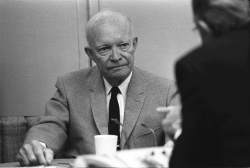 Meeting with General Dwight Eisenhower and other advisors aboard Air Force One
Meeting with General Dwight Eisenhower and other advisors aboard Air Force Onecredit: Yoichi Okamoto
On this day in 1965, President Johnson had telephone conversations with two former presidents about the Vietnam War—Dwight D. Eisenhower and Harry Truman.
President Johnson invited Eisenhower to come to the White House to advise him on Vietnam.
President Johnson and Truman discussed Vietnam, comparing it to the Korean conflict; LBJ reminisced about a letter he sent to Truman following the outbreak of the Korean War; Truman praised LBJ’s handling of events; LBJ invited Truman to the White House to meet with him.
On this day in 1967, President Johnson sent a special message on civil rights to Congress.
“For the task is to give 20 million Negroes the same chance as every other American to learn and grow, to work and share in society, to develop their abilities—physical, mental, and spiritual, and to pursue their individual happiness.”
February 16th
On this day in 1966, President Johnson wrote a letter to the President of the Senate and to the Speaker of the House transmitting report on earthquake recovery assistance to Alaska. In his letter, LBJ wrote,
I have the honor to transmit a report of activity under authority of Public Law 88-451, describing the efforts of five Federal departments and agencies to assist in the recovery of Alaska following the earthquake of March 27, 1964.
…
It is a tribute to the Congress, to the individual citizens of the State, and to the thousands of State and Federal personnel who worked so diligently following the disaster that Alaska has today substantially recovered from the earthquake that devastated her cities less than two years ago.
February 17th
On this day in 1968, President Johnson traveled to Fort Bragg, North Carolina, where he spoke to troops leaving for Vietnam and visited injured troops at Womack Hospital.
The President then flew to El Toro Marine Corps Air Station, California, where he reviewed troops departing for Vietnam.
On this day in 1965, President Johnson sent a letter to the President of the U. S. Senate and the Speaker of the U. S. House on Stepping Up the War on Poverty.
I request the doubling of the War Against Poverty. In addition I request legislation to improve our ability to conduct that war.
We reaffirm our faith that poverty can be eliminated from this country, and our solemn commitment to prosecute the war against poverty to a successful conclusion. For that struggle is not only for the liberation of those imprisoned in poverty, but for the conscience and the values of a prosperous and free nation.
From the very beginning, this country, the idea of America itself, was the promise that all would have an equal chance to share in the fruits of our society.
As long as children are untrained, men without work, and families shut in gate-less poverty, that promise is unkept. New resources and knowledge, our achievements and our growth, have given us the resources to meet this pledge. Not meanly or grudgingly, but in obedience to an old and generous faith, let us make a place for all at the table of American abundance.
Our objective was stated by the Congress in the Economic Opportunity Act of 1964: ‘to eliminate the paradox of poverty in the midst of plenty in this Nation by opening to everyone, the opportunity for education and training, the opportunity to work, and the opportunity to live in decency and dignity.’
February 18th
On this day in 1968, President Johnson addressed the troops on the aircraft carrier, U.S.S. Constellation, and boarded a helicopter to go to Palm Desert, California, where he briefed former President Dwight D. Eisenhower on Vietnam.
February 19th
On this day in 1964, President Johnson made remarks at the White House to a delegation of students from Seton Hall University to thank them for the living memorial to President Kennedy. The delegation from Seton Hall University, South Orange, N.J., presented the President with a parchment scroll signed by 6,000 students and containing the following pledge:
To the President of the United States, as a living memorial to John Fitzgerald Kennedy. I pledge that I shall freely accept the torch which has been passed on my generation, that I shall replace all hatred with tolerance, all rashness with patience, all bigotry with love, that I shall commit myself to the full implications of the brotherhood of man under the fatherhood of God and thereby spread those ideals for which John Fitzgerald Kennedy gave his last full measure of devotion. I therefore pledge you, Mr. President, my loyalty, my cooperation and my prayers.
On this day in 1968, President Johnson sent a letter to Senator Philip Hart expressing his views on pending civil rights legislation.
We have made extraordinary progress in the past decade. Nevertheless equal justice is clearly not a reality for millions of Americans today. The civil rights legislation now pending before the Senate—about which you have asked my views—will not in itself achieve equality for every citizen; but it is a vital step along the way. Both conscience and reason insist that it be passed.
In one title of the pending legislation, we seek new and clear authority to punish those who would use violence and intimidation to prevent others from exercising the rights of American citizenship:
—the right to vote,
—to go to school,
—to obtain a job,
—to serve as a juror,
—and to use public facilities.There should be no question about the exercise of these fundamental rights. There should be no doubt in anyone's mind that their exercise is protected by law against those who would use force to deny them.
Pending legislation before the Senate also seeks. to ensure that every American has the opportunity to provide a decent home for his family. Segregation in housing—the product of long-standing discriminatory real estate practices—has compounded the Nation's urban problem. Minorities have been artificially compressed into ghettoes where unemployment and ignorance are rampant, where human tragedies and crime abound, and where city administrations are burdened with rising social costs and falling tax revenues. Fair housing practices—backed by meaningful Federal laws that apply to every section of the country—are essential if we are to relieve the crisis in our cities.
From every moral and practical standpoint, these measures are necessary. The wrongs they address are urgently in need of redress. Together with the other measures I have recommended to combat discrimination-particularly in the fields of employment and jury selection—they respond to the elemental demands of equal justice in America. They should be adopted without delay.
February 20th
On this day in 1966, President Johnson had a telephone conversation with Secretary of State Dean Rusk. They discussed Senator Robert F. Kennedy’ statement suggesting the Viet Cong be included in the South Vietnamese government; Clark Clifford’s views on a possible new congressional resolution on Vietnam; presidential war powers; Defense Secretary Robert McNamara’s views on limiting U.S. objectives in Vietnam and pessimism about the war.
On this day in 1968, President Johnson signed the Commodity Exchange Act Amendments. LBJ stated,
“The new legislation adds the active and growing market in livestock and livestock products to the commodities regulated under the act, and increases the criminal penalties for illegal trading abuses such as market manipulation and embezzlement. Although regulatory responsibility for commodity trading will remain primarily with the exchanges themselves, the new amendments will substantially strengthen the enforcement authority of the Secretary of Agriculture.
“Consumer groups, food processors, farm organizations—and the commodity exchanges themselves—have joined the administration in supporting this legislation.”
On this day in 1967, President Johnson awarded the Presidential Unit Citation to the 21st Tactical Air Support Squadron, USAF, for service in the Vietnam War. LBJ said,
“The 21st Tactical Air Support Squadron, Pacific Air Forces, distinguished itself by extraordinary gallantry in connection with military operations against an opposing armed force in Southeast Asia, from 1 August, 1965 to 1 February, 1966. During this period, personnel of the 21st Tactical Air Support Squadron repeatedly risked their own lives by exposing themselves to hostile ground fire while flying unarmed aircraft in order to effectively identify enemy targets and direct air strikes. Their actions resulted in the success of major ground operations and the saving of hundreds of friendly lives. The extraordinary heroism displayed by this unit in the pursuit of its mission is in keeping with the highest standards of performance and traditions of the United States military service. By their gallantry and untiring devotion to duty, the personnel of the 21st Tactical Air Support Squadron reflect great credit upon themselves and the United States Air Force.”
February 21st
February 22nd
On this day in 1964, President Johnson made remarks in Los Angeles at a Mexican fiesta given in his honor by President Lopez Mateos of Mexico. LBJ stated,
“The Alliance for Progress, born in this hemisphere, is a collective war on poverty in this hemisphere. The war on poverty and its somber allies, misery and disease and illiteracy, is a war that the free American Republics must win. If we don't win, humanity fails, and there is no more valiant leader in this war against poverty than the great President of Mexico, Adolfo Lopez Mateos.”
On this day in 1968, President Johnson sent a special message to the Congress on Urban Problems: “The Crisis of the Cities.”
The human problems of the city are staggering:
—Ghetto youth with little education, no skills and limited opportunity.
—Citizens afraid to walk their streets at night, and justifiably so.
—Negroes, Puerto Ricans and Mexican Americans barred by prejudice from full participation in the city's life.Illiteracy and disease, a lack of jobs and even dignity itself—these are the problems of the city, just as its tenements, traffic jams and rats are problems.
The city will not be transformed until the lives of the least among its dwellers are changed as well. Until men whose days are empty and despairing can see better days ahead, until they can stand proud and know their children's lives will be better than their own—until that day comes, the city will not truly be rebuilt.
That is the momentous and inescapable truth we face in this hour of America's history.
No single statement or message can embrace the solutions to the city's problems. No single program can attack them.
No one can say how long it will take, or how much of our fortune will eventually be committed. For the problems we are dealing with are stubborn, entrenched and slow to yield.
But we are moving on them—now—through more than a hundred programs, long and short range, making financial commitments of more than $22 billion to the task.
…
If the problems of the city are to be solved, there can be no retreat in the War on Poverty. It must be pressed, with renewed emphasis on the most critical needs of the poor—job opportunities and education for the young, and the chance to join in cooperative self-help efforts to improve their own lives, as well as to participate in the broader community attack on poverty.
Last year the Congress extended the life of the poverty program for two years—but it appropriated only $1.77 billion, some $290 million less than we sought.
For Fiscal 1969, I recommend appropriations to the full level of Congressional authorization—$2.18 billion—for the anti-poverty program.
February 23rd
On this day in 1968, President Johnson wrote a letter to the President of the Senate and to the Speaker of the House proposing a bill to simplify the entry of foreign visitors.
By imposing time-consuming entry requirements, we discourage tourism to the United States at a time when we are acutely concerned with our balance of payments.
By imposing stringent requirements, we appear to a foreign visitor to be greeting him grudgingly rather than graciously.
By imposing complicated requirements, we add an unnecessary and increasingly expensive workload to our consulate staffs abroad.
I believe the time has come to stop imposing these unnecessary requirements on our visitors. To accomplish this, I propose the Non-immigrant Visa Act of 1968.
The proposed legislation was not enacted by the 90th Congress.
On this day in 1966, President Johnson made remarks after receiving the National Freedom Award at the Waldorf-Astoria Hotel in New York City.
“Here in America, we accord every man the right to worship as he wills. I believe we are more tolerant of sectional and religious and racial differences than we were a quarter of a century ago. The majority of our people believe that a qualified man or woman, of any race, of any religion, of any section, could hold any office in our land. This was not so—not very dear at all—in 1940.
“We are committed now—however great the trial and tension—to protecting the right of free expression and peaceful dissent. We have learned to despise the witch hunt, the unprincipled harassment of a man’s integrity and his right to be different. We have gained in tolerance, and I am determined to use the high office I hold to protect and to encourage that tolerance.
“I do not mean to say that I will remain altogether silent on the critical issues of our day. For just as strongly as I believe in other men’s freedom to disagree, so do I also believe in the President’s freedom to attempt to persuade. So, let me assure you and my fellow Americans tonight that I will do everything in my power to defend both.”
February 24th
On this day in 1964, President Johnson issued Proclamation 3575: National Farm Safety Week. LBJ stated,
“Now, therefore, I, Lyndon B. Johnson, President of the United States of America, do hereby call on the people of the Nation to observe the week beginning July 19, 1964, as National Farm Safety Week; and I urge all persons and organizations, particularly those working in agriculture, to unite in a strong and purposeful effort to reduce farm, home, and rural highway accidents to an irreducible minimum.”
On this day in 1965, President Johnson issued Proclamation 3638: National Defense Transportation Day and National Transportation Week. LBJ stated,
“Now, therefore, I, Lyndon B. Johnson, President of the United States of America, do hereby designate Friday, May 21, 1965, as National Defense Transportation Day, and the week beginning May 16, 1965, as National Transportation Week; and I urge our people to participate, with representatives of the transportation industry, our armed services and other governmental agencies, in the observance of these occasions through appropriate ceremonies.”
February 25th
On this day in 1965, President Johnson made remarks following a briefing at NASA in Washington, D.C.
“I think it is characteristic of NASA and of Jim Webb and of our American science community that you haven’t dwelled much on the achievements of last Saturday of Ranger-8. Instead, you have looked ahead to the future and to the great success that you think is down the road—that you can anticipate with the Mariner mission to Mars.
“I feel somewhat close to this agency and this program. The Space Act of 1958 was one of the measures that I authored during my 25 years in Congress, and I expect is one of my proudest legislative accomplishments. I think it is really incredible that we have come so far. It was only 7 years ago this month that we were deliberating and debating and still seeking to come to grips with the realities of the space age.
“I need not recall some of the comments made during that period about the follies that we were about to embark upon, but from that beginning we have moved in these years to realities of accomplishments far beyond our greatest expectations.
“I think a great deal of that is due to the quality and the character and the morale of the people who man the ramparts here in the Space Agency. I doubt that I have ever known a more genuine or competent or dedicated administrator than Jim Webb. How he could come in here with his bare hands and lead this group to the achievements that have come to pass is nothing less than phenomenal.
“I remember the morning when he started out in my office with Dr. Dryden and they made a contract that the two of them together, and later Dr. Schneiderman joined them and others, would see this thing to a conclusion.
“I told Dr. Dryden and Mr. Webb as they left the office that I wouldn't be bothering them. I had made a suggestion or two before Mr. Webb had been appointed, but I wouldn't recommend any contractors, I wouldn't suggest any personnel, I wouldn't try to pass any of my kinfolks down the line to him, or recommend any brother-in-law. But, that, if he got in trouble, to come to see me—I would be ready and willing. And he hasn't been back.
“That is a tribute not only to the personnel that mans this shop, but to the Congress and to the scientific community and to the great industrial genius that is America.
“Now I want to say a word about the space feats last week, the continuing Mariner probe, the forthcoming Gemini flights. I think they are indications of the rapid advances that we are making and that we are going, in the name of this country, to continue to make in the exploration of space.
“Our purpose is not—and I think all of you realize never will be—just national prestige. Our purpose remains firmly fixed on the fixed objective of peace. The frontier of space is a frontier that we believe all mankind can and should explore together for peaceful purposes, and I have enunciated that doctrine in all the forums in which I have been allowed to trespass. This has been, and is going to continue to be, the policy and the purpose of the United States Government.”
On this day in 1960, Senator Johnson issued a statement on Eisenhower’s veto of the water pollution bill. The bill, which passed the Senate Feb. 15th, would have increased authorization for sewage plant construction from $50 million to $90 million a year. Eisenhower vetoed the bill saying that water pollution is a “uniquely local blight.” The House sustained the veto on Feb. 25th.
February 26th
On this day in 1965, President Johnson wrote a letter to the President of the Senate and to the Speaker of the House on the Peace Corps. In his letter, LBJ wrote,
So the Peace Corps can no longer be viewed as just a feather in our Nation’s cap. It is an essential part of our democratic program in meeting our world responsibilities and opportunities. It has become a major instrument for economic and social development. And in learning about nation-building, it is providing a corps of dedicated and experienced Americans who, upon their return, will help us continue to strengthen this Nation at home.
The urgent yet prudent requests from host countries for volunteers are growing. There is ample justification and great need to satisfy these requests. To meet these needs we must utilize in the Peace Corps the talents, energy, and enthusiasm of all interested and capable citizens who volunteer in such large numbers.
The requested Peace Corps authorization for Fiscal Year 1966 is an increase of $21.1 million over the amount appropriated by the Congress for Fiscal Year 1965. This increase will enable the Peace Corps to expand from a level of 15,000 by the end of August 1965, to 17,000 volunteers by the end of August 1966.
It is my belief, therefore, that a growing Peace Corps of increasing capabilities and effectiveness is essential. Our responsibilities to ourselves, to our Country, and to the world require no less.
February 27th
On this day in 1964, President Johnson made remarks at the Ground-Breaking Ceremony for the Florida Cross-State Barge Canal.
“We will construct a canal across northern Florida to shorten navigation distances between our Atlantic and our Gulf coasts. When this canal is completed, it will spark new and permanent economic growth.”
February 28th
On this day in 1966, President Johnson had a telephone conversation with Larry O’Brien, Postmaster General. They discussed Senate criticism of the Vietnam War policy; Senator Robert F. Kennedy’s views on Vietnam; O’Brien’s comparisons of Robert F. Kennedy and John F. Kennedy; and positive reaction to O’Brien’s Vietnam speech.
On this day in 1967, President Johnson issued a statement upon recommending development of a nuclear-powered rocket engine and new nuclear research facilities.
“I have today sent to Congress a 1968 budget amendment totaling $149.8 million for three significant scientific projects:
“—The development of a nuclear powered rocket engine, the “Rover.”
“—A meson physics laboratory for basic physical and biomedical research.
“—A specialized facility for further exploration into controlled thermonuclear fusion as a potential source of electricity.
“These projects will advance America’s ability to harness atomic energy for the peaceful exploration of space. They will also help us chart new courses in nuclear science.
“The additional appropriations I have recommended for the Atomic Energy Commission and the National Aeronautics and Space Administration will not increase my total fiscal 1968 budget.”
February 29th
On this day in 1968, President Johnson made a toast in a dinner honoring the state governors. In this toast, he stated,
“In all, there have been more than 2,500 State and Federal officials meeting to try to better the ways to serve the people who pay all of us and entrust all of us with the responsibilities.
“Their agenda was 20th century America. In these meetings we explored the challenges of housing, pollution, transportation, law enforcement, New Haven railroads, education, health, job opportunities.
“These challenges, we know, leapfrog State boundaries. They confront us all as Americans, because there is one thing we should never lose sight of:
“When a child in one area gets a better education than a child in another;
“When a baby in one neighborhood has a higher chance of survival than a baby in another neighborhood;
“When the smoke of one city poisons the air of another city;
“When the crowded highways in one State slow the commerce in another State.”
The New York City Center Light Opera Company performed excerpts from Fiorello! at this White House dinner for governors and their wives.
On this day in 1964, President Johnson revealed in a news conference development by the United States of the A-11 experimental jet airplane able to fly more than 2,000 mph at an altitude of more than 70,000 feet.
On this day in 1968, President Johnson made remarks at a Farewell Ceremony at the Pentagon Honoring Defense Secretary Robert McNamara.
“Bob McNamara’s career is just about the textbook example of the modern public servant, but I suspect there are many others out there before me now in uniform and in civilian clothes, high ranking and not so high ranking, who also qualify as modern public servants.
“I want to say to each of you that your country is grateful to you for the quality of the work that you do on behalf of all of us, as your country is grateful to this good man, Bob McNamara, to whom we have come here today to say goodbye and farewell.”
After arriving in the garage of the Pentagon, President Johnson and his aides were met by Secretary McNamara. After entering the elevator, the car started and then stopped. They were in car number 13. After approximately 12 minutes, the doors to the elevator were opened and the President and the group climbed out. The President walked to the car after the ceremony.

